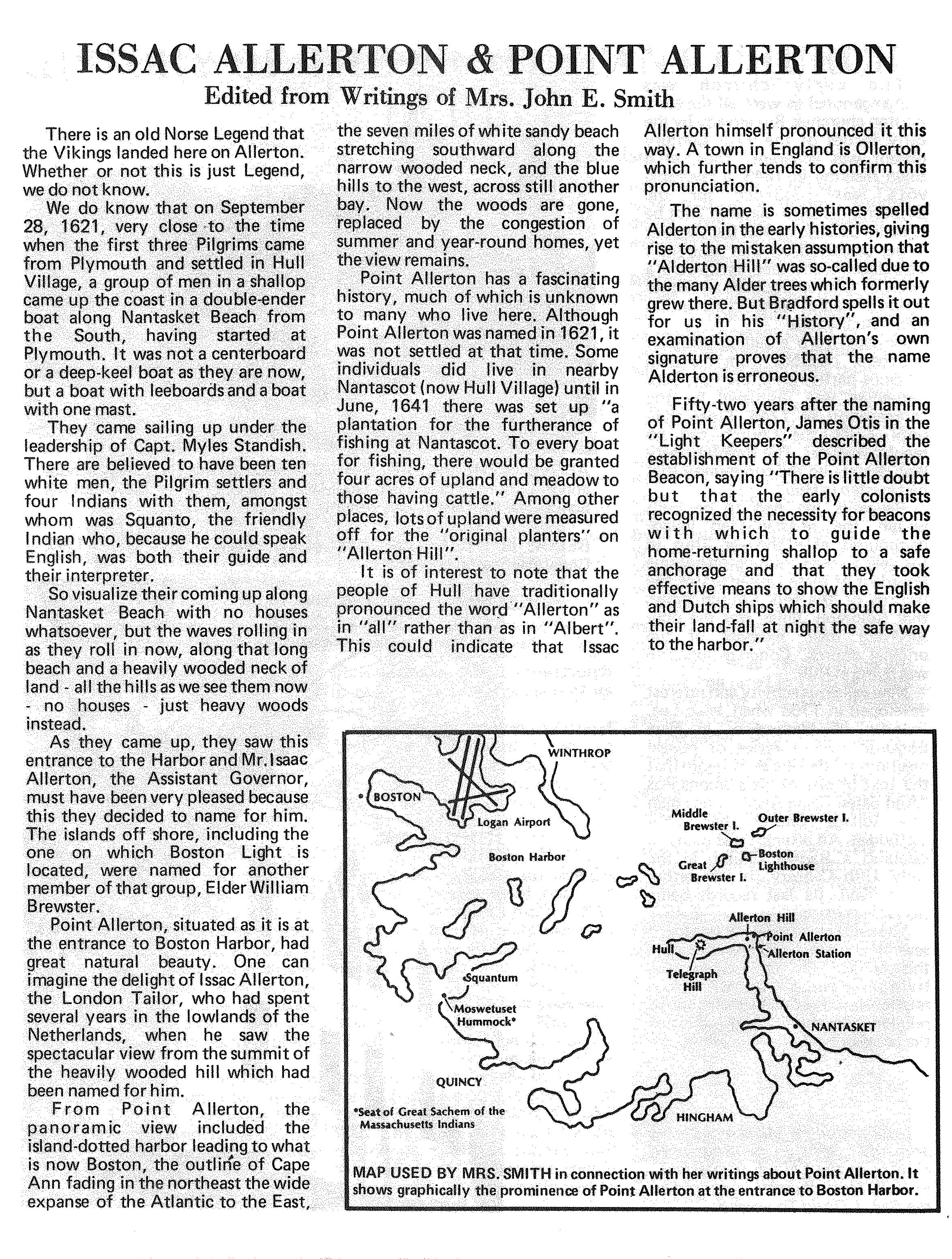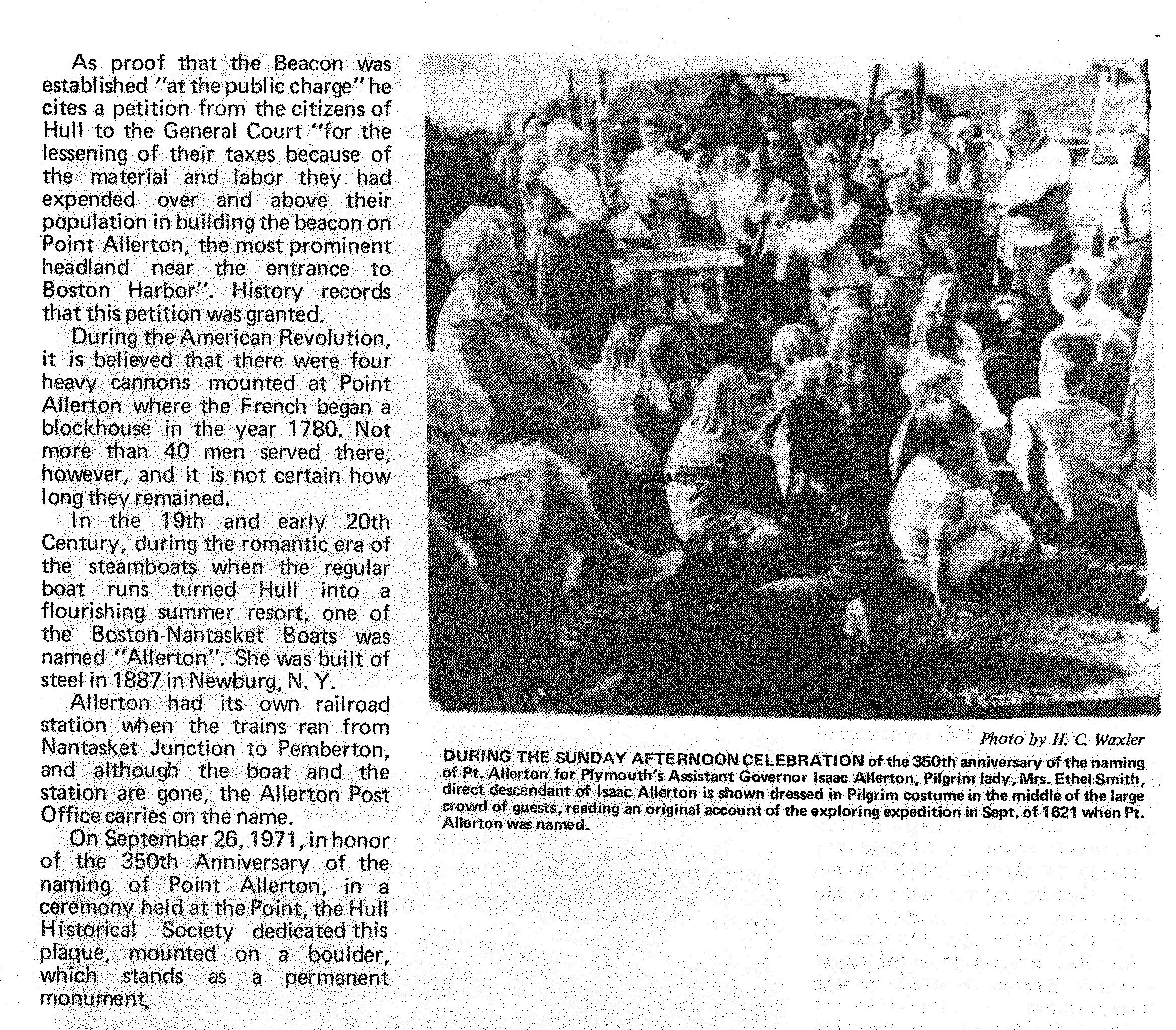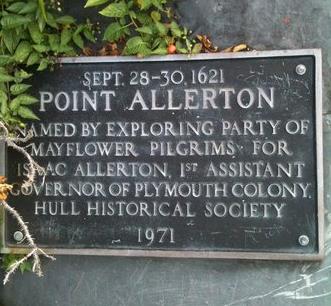
BACK TO HISTORY
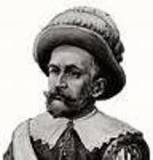
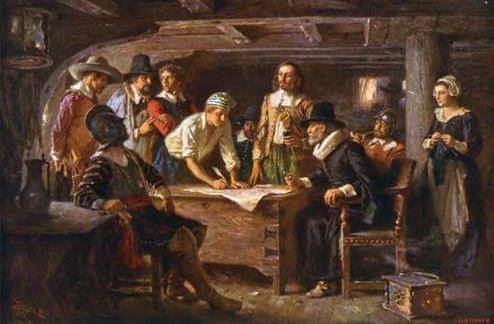
Allerton was the fifth of the Pilgrims to sign the Mayflower Compact
Isaac Allerton
Point Allerton is named for Isaac Allerton (also spelled Alderton) who, along with his family, were passengers on the Mayflower in 1620. His was the fifth signature on the Mayflower Compact and he would became assistant to the colony's first governor, William Bradford and later marry the daughter of senior elder, William Brewster. Allerton was on the boat that sailed north from the colony and into Boston Harbor in 1621.
Isaac Allerton was not a typical Pilgrim Father. He would be banished from the colony in 1630, accused of betraying the colony's trust by "overcharging and mishandling the colony's finances and increasing the colony's debt without approval.” He left Plymouth and started trading stations on the Kennebec and Penobscot Rivers. In 1632, he established a fishing enterprise in Marblehead and along with Moses Maverick, brother of early Massachusetts colonist Samuel Maverick, is considered one of the founders of the town.
In 1635, Allerton was banished once again, this time for befriending religious separatist Roger Williams and bringing back to New England previously banished colonist Thomas Morton. He then settled in New Haven, Connecticut where he began working with the Dutch in New Amsterdam (New York City) building a warehouse trading in tobacco. Along with the Dutch, he would eventually trade with the Native Americans, the English, the Swedes, the French, and the Spanish. His mercantile connections stretched from
Isaac Allerton was not a typical Pilgrim Father. He would be banished from the colony in 1630, accused of betraying the colony's trust by "overcharging and mishandling the colony's finances and increasing the colony's debt without approval.” He left Plymouth and started trading stations on the Kennebec and Penobscot Rivers. In 1632, he established a fishing enterprise in Marblehead and along with Moses Maverick, brother of early Massachusetts colonist Samuel Maverick, is considered one of the founders of the town.
In 1635, Allerton was banished once again, this time for befriending religious separatist Roger Williams and bringing back to New England previously banished colonist Thomas Morton. He then settled in New Haven, Connecticut where he began working with the Dutch in New Amsterdam (New York City) building a warehouse trading in tobacco. Along with the Dutch, he would eventually trade with the Native Americans, the English, the Swedes, the French, and the Spanish. His mercantile connections stretched from
"In September, 1621, a party of ten, including Isaac Allerton, went by water to explore what is now the harbor of Boston, and to visit the Indians who lived in that vicinity, and on this trip the first headland at Nantasket, at the entrance to the harbor was called Point Allerton, a name which it still retains..." From A History of the Allerton Family in the United States
the rivers of Maine to the West Indies, and all the way back to Europe. The New England that would someday become a trade and mercantile powerhouse owed much to Isaac Allerton.
Allerton's supporters paint a picture of an 18th-century man decades ahead of his time. His early negotiations in London for the Pilgrims are considered by some as the first leveraged buyout in America, and ensured that the colonists, while being burdened by debt, would have title to the land. This was a break from the landed gentry and servant traditions of Europe, and while it wasn’t the communal ownership the religious leaders had hoped for, it was a realistic model that would ensure prosperity in New England.
Allerton's supporters paint a picture of an 18th-century man decades ahead of his time. His early negotiations in London for the Pilgrims are considered by some as the first leveraged buyout in America, and ensured that the colonists, while being burdened by debt, would have title to the land. This was a break from the landed gentry and servant traditions of Europe, and while it wasn’t the communal ownership the religious leaders had hoped for, it was a realistic model that would ensure prosperity in New England.
Born: c. 1586 in St. Andrews under Shaft, London
Died 1 April 1659 in New Haven, Connecticut
1st Married - Mary Norris - Nov 1611
2nd Married - Fear Brewster (1606-1634), the daughter of William Brewster (1567-1644) in 1626 (a Mayflower pilgrim). With her he had another son naming him Isaac Allerton Jr.
Died 1 April 1659 in New Haven, Connecticut
1st Married - Mary Norris - Nov 1611
2nd Married - Fear Brewster (1606-1634), the daughter of William Brewster (1567-1644) in 1626 (a Mayflower pilgrim). With her he had another son naming him Isaac Allerton Jr.
Allerton died in February 1659 and was buried under the New Haven town common. Although his estate, when inventoried, appeared to be large, he was in fact found to have died insolvent.
A BRIEF HISTORY OF ALLERTON HILL
